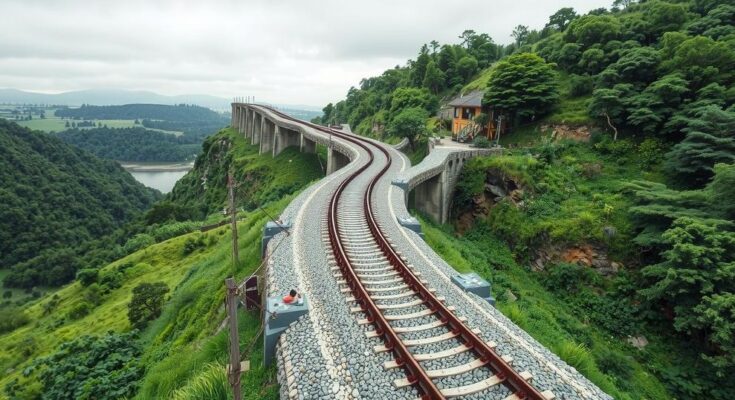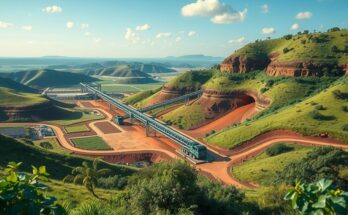Tanzania and Burundi are partnering with Chinese firms to build a major railway that will transport vital minerals such as nickel to the Port of Dar es Salaam. The $2.15 billion project, supported by the African Development Bank, aims to bolster trade and infrastructure within the region, but raises concerns about long-term debt and dependency on China.
Tanzania and Burundi have initiated a partnership with Chinese firms to construct a crucial railway connecting their nations. This $2.15 billion project aims to enhance the transportation of vital metals, particularly nickel, to the Port of Dar es Salaam. The construction will be helmed by China Railway Engineering Group Ltd and China Railway Engineering Design and Consulting Group, as confirmed by Tanzanian Transport Minister Makame Mbarawa during the signing ceremony.
The 282-kilometer railway is expected to facilitate the transport of up to three million metric tons of minerals annually. This initiative is notably financed by the African Development Bank (AfDB), according to Tanzania’s Finance Minister, Mwigulu Nchemba. China’s longstanding engagement with Africa, particularly through infrastructure development under the Belt and Road Initiative, indicates growing economic ties between the continents.
China has historically served as Africa’s largest trading partner, contributing significantly to infrastructure through loans and investment. In 2023 alone, President Xi Jinping committed nearly $51 billion for infrastructural advancements across Africa, including the promise of creating one million jobs. Furthermore, Chinese investment in African projects saw a resurgence last year, with lenders approving $4.61 billion in loans, signaling a renewed commitment after a previous slowdown.
While these infrastructure projects are anticipated to bolster economic growth in the region, there are increasing concerns regarding potential long-term implications. Issues of rising debt levels, economic dependency on China, and the environmental and social impacts of large-scale construction are points of contention among analysts and policymakers.
The construction of a railway between Tanzania and Burundi highlights the growing investment interests from China in African infrastructure. The partnership aims to facilitate the efficient transport of significant minerals, such as nickel, which is essential for manufacturing batteries. This initiative reflects broader trends in Chinese investment in Africa, which have profound implications for regional development and economic relations.
The railway project linking Tanzania and Burundi marks a significant development in African infrastructure, primarily financed by Chinese firms and the African Development Bank. While it promises economic benefits through enhanced mineral transportation, the long-term consequences of increasing reliance on Chinese investment must be carefully managed to avoid potential pitfalls, such as mounting debt and environmental concerns. As these developments unfold, stakeholders will need to balance economic growth with sustainability and autonomy for African nations.
Original Source: africa.businessinsider.com




